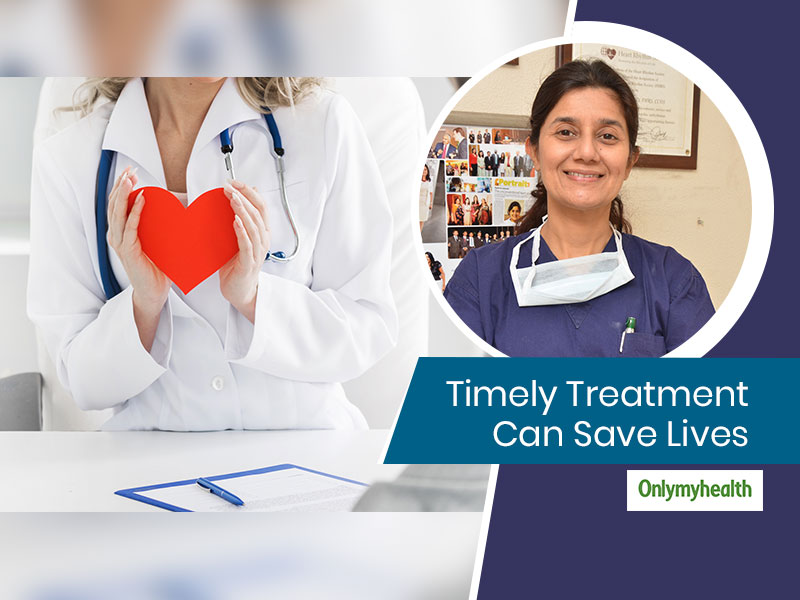
Living in unprecedented times of COVID-19 have compelled people to deploy measures that can keep them healthy staying indoors. People are unsure about when the coronavirus curve will bend, however, one thing is certain that there is a dire need for everyone to live a heart-healthy life now more than ever. Dr. Aparna Jaswal, Additional Director, Cardiology and Electrophysiology, Fortis Escorts Hospital, Delhi explains the role of timely medical intervention in saving lives of heart patients.
Table of Content:-
As per the National Crime Records Bureau, out of all cardiovascular diseases, heart attacks, also known as myocardial infarction, increased by 53 percent in five years with 18,309 deaths in 2014 and 28,005 in 2019. And now when we are battling the worst pandemic of our times, we have certain challenges and facts staring us in the face. For instance, surprisingly when a surge was recorded in heart attack cases until last year, since the outbreak of COVID-19, hospitals around the world including India have witnessed about 50 percent decrease in patients with acute heart attacks. Some researchers and doctors state stress-free lifestyle as the reason for less heart attack cases, others believe restriction in the movement became a hindrance for people to reach hospitals for treatment. I believe it could also be that people ignored their symptoms as they feared contracting the virus on their visit to the doctor.
Sudden chest pain that gives a heavy and tight sensation and soon spreads to other parts of the body like the arms, jaw or back neck – calls for immediate medical intervention as this could be a sign of heart attack.

While the statistics related to heart attack are eye-opening, the good news is that the situation is manageable through simple lifestyle changes that can aid to keep the heart healthy. These include maintaining a healthy weight, exercising regularly, eating healthy, quitting smoking, and keeping a positive mind set by indulging in stress-free activities such as meditation and yoga. Once an individual follows these lifestyle measures, cholesterol, blood pressure and blood glucose level will be under control automatically. However, where the situation is critical, medical help becomes imperative.
Also Read: All about Chest Physiotherapy For Improved Lung Functions and Better Respiration
Understanding myocardial infarction and its causes
When one of the coronary arteries of the heart is blocked or has an obstruction in the blood flow, a heart attack occurs. It is usually caused by the build-up of a fatty substance called plaque in the coronary arteries that slows or completely blocks the blood flow to the heart muscle over time. When the blood supply to the heart is totally blocked, the heart cannot get the oxygen it needs.

The coronary artery supplies blood to heart muscles which is interrupted due to the blockage resulting in less blood supply to different parts of the body. Inadequate or no supply of blood causes pain in various body parts such as arms, neck, back, jaw or stomach. Some arteries also supply blood to the parts of the heart that are responsible to regulate heartbeats. Blockage causes fatal and abnormal heartbeats called cardiac arrhythmias. Of course, it is normal for the heart rate to vary when you are doing different activities. However, a heart rate that is either too fast or slow can reduce energy levels, cause fatigue, shortness of breath, chest pain, dizziness, and lightheadedness.
Potential options for timely diagnosis and prognosis
The good news is that with advancements in medical technology, we now have diagnostic tests and treatments for almost all heart problems. Based on the symptoms, a doctor can recommend an Echocardiogram test and will also evaluate your condition by asking questions regarding the heart attack. ECG helps to identify what happened to the heart muscle and the heart rate along with rhythm can be monitored continuously. Another test called ejection fraction is carried to determine the overall functioning of the heart and the percentage of blood that is pumped out of the chambers of the heart with each heartbeat. A reduced ejection fraction indicates the weakness of the heart muscle, heart attack that damaged the heart muscle, heart valve problem and uncontrolled high blood pressure.
Also Read: Does Your Heart Beat, Race Or Slow Sown Suddenly? Check Out The Possible Causes And Advices

In the cases where ejection fraction is less than 30 percent, an implantable cardioverter-defibrillator (ICD) helps in survival. ICD detects and stops abnormal heartbeats. Monitoring the heart rhythms, such technologies deliver pulses or shocks to restore a normal heart rhythm, even when the person is at home. These technologies run on batteries that is sealed inside the device. Earlier, these devices came with batteries that depleted every three to seven years but credit to innovation, batteries now last for 13 to 16 years. This reduces the need of device replacement, risk of infection and treatment cost.
As per studies, many people die before they make it to the hospital as they have ignored their symptoms. It is better to seek a doctor’s advice than being unsure about your condition at home. And as rightly said by The World Heart Federation, “never avoid calling the emergency services if you need to – it’s safe and medical professionals are there for you.”
Read More Articles in Heart Health
Also watch this video
Read Next
Is There An Increased Risk Of Heart Failure During The Pandemic? Know What This Expert Has To Say
How we keep this article up to date:
We work with experts and keep a close eye on the latest in health and wellness. Whenever there is a new research or helpful information, we update our articles with accurate and useful advice.
Current Version